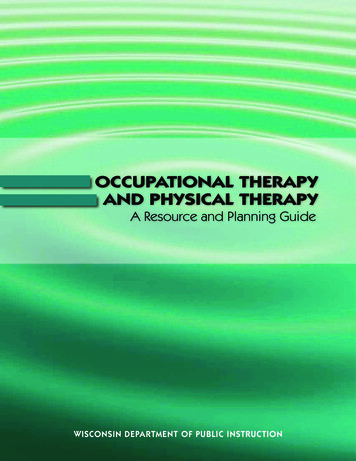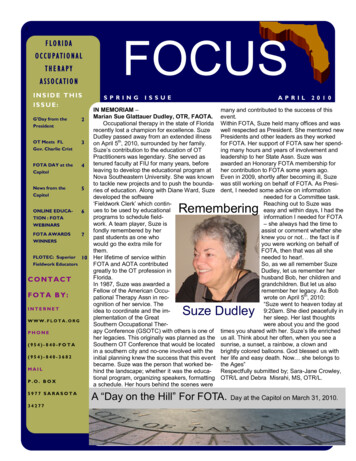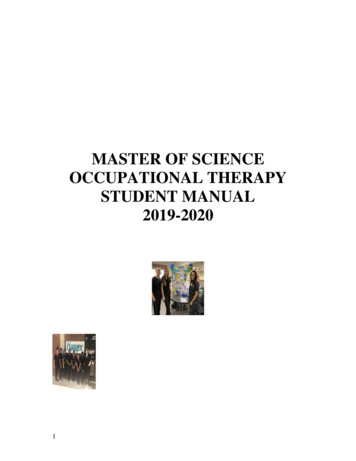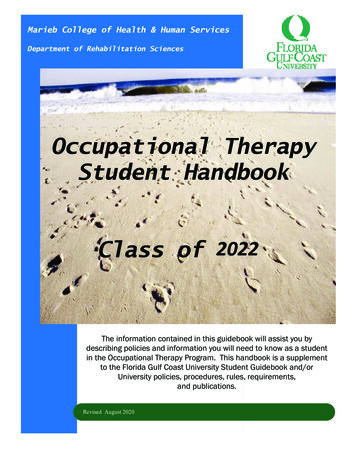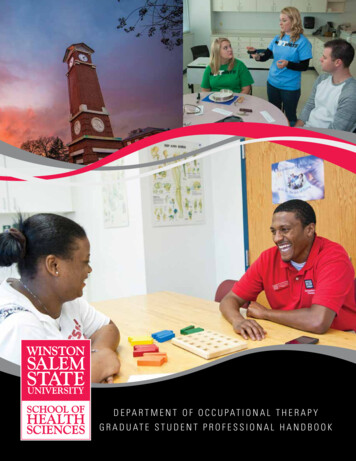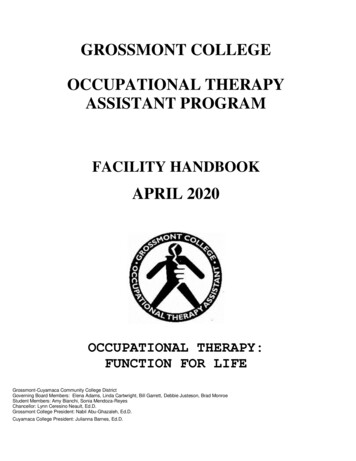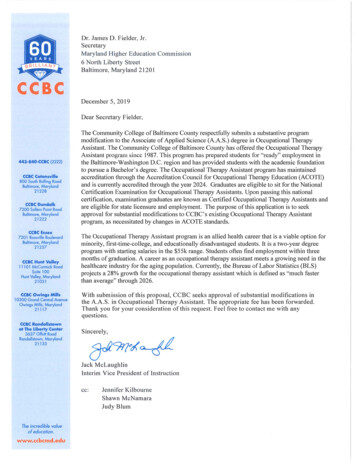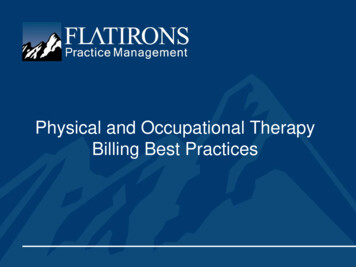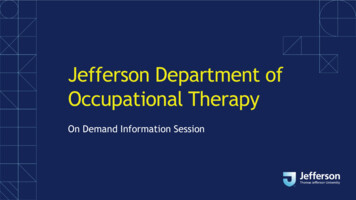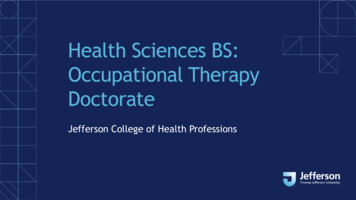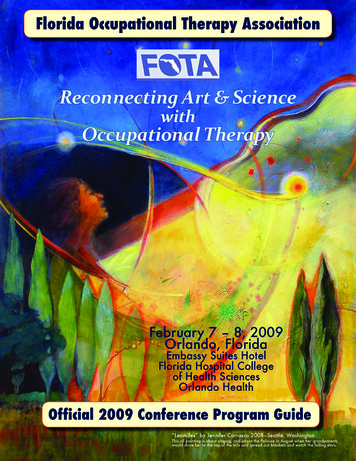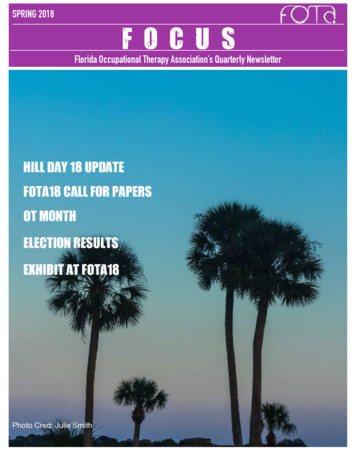
Transcription
SPRING 2018f o c u sFlorida Occupational Therapy Association’s Quarterly NewsletterHill Day 18 UpdateFOTA18 Call For PapersOT MonthElection ResultsExhibit at FOTA18Photo Cred: Julie Smith
in this issueFrom the Editor’s DeskFrom the Editor’s Desk, Cover Art2Message from the President3-4Mental Health Data CollectionReport5-6HILL DAY 18 Update6Government Affairs News: OTsTestify in Tallahassee --Session20187WHYYOU SHOULD TRAVEL ABROADFOR YOUR LEVEL 1 FIELDWORK:CULTURAL COMPETENCE8Motivations Inc Ad9Mental Health and the SchoolBased OT Practitioner10-11Employee Recruitment andRetention in Academics12Occupational therapy approachusing alternative modalities andtreatments for chronic venouswounds: case report13-14FOTA18 Conference: Hotel, CallFor Papers, Exhibitor Info &Awards16-17Spring 2018Kurt K. Hubbard, PhD, OTD,OTR/L, FAOTAEditor, FOTA FOCUS mHello FOTA members. A heartyHAPPY OT MONTH! This is theSpring 2018 issue of FOCUS. Inthese pages, you will find someupdates relating to healthcare issuesstate wide impacting OT practitioners, as well as other timelytopics of interest. In addition, this issue includes scholarlyinformation from the Chairs of the Education, Mental Health,Gerontology, and School Systems/Early Intervention SpecialInterest Sections. Speaking of scholarly information, pleaseconsider sharing your knowledge and skills with other FOTAmembers at this year’s Annual Conference. The theme for 2018is “Advancing you practice: translating knowledge faster,” andwill be held October 26-27 at the Renaissance Orlando atSeaWorld. The goal of this conference is to offer a variety oftopics with an emphasis on timely techniques and evidence.The call for papers is currently open through May 4th forprofessional posters, short courses, workshop, & SISconversations that matter. Student poster deadline for the fallFOTA conference is September, 2018. Hope to see some of youin Utah at the annual AOTA conference and expo.Best,KurtCover Art: Julie Noel Smith is a St.Augustine based photographer andfilmmaker who recently relocated to the areaafter 17 years in New York City working forthe advertising agency Ogilvy and Matherand as a partner in the web developmentcompany E-dentities. Julie specializes ineditorial images and her fine art prints are available at PastaGallery in downtown St. Augustine. www.julienoelsmith.comwww.flota.org[2]
From the President3.The Leadership Development ProgramCommittee is planning the next event for May 12at NSU Ft. Lauderdale. With the help of our newCo-Chair, Nadya Ramos, COTA/L, our committeehas opened nominations for the next leadershipdevelopment event. Our nominations are open toOT and OTA practitioners, as well as students, andwe encourage new graduates and seasonedprofessional alike to self-nominate or benominated. Our Keynote Speaker on Leadership willbe Sandee Dunbar, DPA, OTR/L, FAOTA.Nominations for the program are now open andmore information is available in this newsletter andat http://www.flota.org/leadershipprogram .Selected nominees will be provided a 6hour CE credit course and seminar on leadershipand mentorship for a fee of under 50.00.4.New Ad Hoc Committee on School SystemMental Health, Safety and DisasterResponse: Our SIS Chair Anjali Parti, will bejoined by Mirtha Whaley, Kurt Hubbard, SarahFabrizi, and Kim McKinney (SIS Chairs) in theinception of an Ad Hoc Committee to address thisimportant issue and create resources andprogramming unique to the needs of Florida OTs onthis matter. This is in the early development stageand is a much-needed new project. Our firstmeeting to develop this project took place in Marchand more details are emerging with the ongoingwork done by the committee.5.Membership Committee: Our Membership Chair,Rachel Romero, now has a few members helpingher in her duties on the Membershipcommittee. Our primary (short-term) plan is to getback to basic regular contact with members (torenew) and reach out to prospects in our e-maildatabase, and leverage promotions on social mediato get the message out to promote FOTAmembership, and build our membership numbers –to be sent out once per month. April will be amembership drive month, and we are encouragingregional reps to engage potential members in localOT month events in the community. An Ad HocCommittee, led by Dana Dixie and LindaStruckmeyer (Regional Reps), is designing anew hard copy brochure to promote FOTAmembership for use at live events – to be approvedand printed as soon as possible. The secondary(long-term) plan is to consider adding CEU benefitsto members, especially new grad practitioners whotransition from student status with online and inperson CEUs offered at cost-effective rates forjoining/renewing with FOTA.6.FOTA Elections: Voting in the 2018 Elections forPresident-elect and Secretary officially endedMarch 30 and election results are to be announcedsoon. Thank you to all the candidates who put themself forth for the board positions. We will be findingHello FOTA Members!Thank you for being a member ofour state association. Our board isworking hard to provide qualityinformation and quality services toearn your continued membership.Since our Winter Edition ofFOCUS, much has happened inour sunshine state. I wanted totake this opportunity to update youon FOTA events and developments:1.2.Governmental Affairs: A big thanks to SharonRosenberg and Kelly Uanino, our GovernmentalAffairs Co-Chairs for coordinating a verysuccessful Hill Day on January 10th, 2018. Therewas a good turnout of OT practitioners, faculty, andstudents from FAMU OT program and Keiser U OTAprogram. Our lobbying firm, Corcoran & Johnstonset up office meeting with 15 Florida representativeswhere we were able to engage in small groupdiscussions with the legislators about OT practice inFL. Later in January, two OTs -- Jian JonesStewart, an OT professor and FieldworkCoordinator at FAMU, and OT private practiceowner, Tammy McKenzie, testified in front ofSenate and House Committees on the Opioid Crisisand the roles of OT in management of chronic painand substance abuse intervention. In March, Sharonand Kelly met with Medicaid Administrators todiscuss increasing flexibility for billing, coding, andconsumer access to the FL Medicaid Program.Overall, this has been an eventful FL legislativesession and FOTA has been active in Tallahassee inadvocating for OT practice and our clients on avariety of issues. For more visit: http://www.flota.org/government-affairsConference 2018 Committee is Gearing up: The2018 FOTA Conference will be held October 26-27at Renaissance Orlando at SeaWorld . Tia Hughes,Conference Convener and her team are gettingplans underway, with the call for papers currentlyopen! The 2018 Conference Theme is ThemeTranslating Knowledge Faster- Advancing YourPractice. There are great plans underway to get theconference course list out early this year – byAugust. Our goal this year at conference is to saluteand serve OT clinicians—providing relevant anduseful continuing education content for those whodirectly serve OT clients, and seek to advance theirskills and knowledge. We sincerely hope moreclinicians attend our conference and are engagedas vital part of the state association and are inspiredto continue their membership and involvement withFOTA. Please visit: g 2018www.flota.org[3]
opportunities for you all to stay involved andassume leadership roles in FOTA. Muchappreciation to Cari Slutsky-Murray, andPauline Kelly for their service in organizing theseelections and serving on the NominationsCommittee. Election information can be found at:7.The Review Process for Bylaws, Policies, andProcedures continues: David Pallister, BPPCChair continues coordinating the process ofindividual and collective documents review andrevisions of our documents. Several of thedocuments most need of updating will beshared and voted for approval at the June faceto-face meeting.8.Save the Date for the June Face-to-FaceBoard Meeting: Saturday, June 16th at NSUTampa. We will be hosted by the OTD Programat NOVA in Tampa for a day of meetings. Pleasemark your calendar. Members-at-large areencouraged to attend our board meeting. If youhave issues or items of concern please contactme at president@flota.org.9.As for me -- Presidential Activities: I havecontinued outreach in support of the variousstanding and ad hoc committees, includingassisting Elena Vizvary, our VolunteerCoordinator, in recruiting some new volunteersfor committees and other roles. I continue aweekly practice of posting relevant informationon our Facebook Page, and FOTA Lobbyingpages, posting in the local forums. I try to do alot of posts about a variety of issues includingresources for OTs to contact their electedrepresentatives to share their individualperspectives on issues. Samarra St. Hillarie didan online interview with me for the FOTA Region5 FB page, and that was fun -- view here:https://youtu.be/JSZ-P2Q0ktM . Posting to thePresidential Blog: http://www.flota.org/blogare becoming more frequent, and in theupcoming month, a shift from Legislative issues,to membership building will begin on our socialmedia. Occasionally, at FOTA “Contact Us”question will come through that I respond to forFOTA. I have been in contact with Edwin Myer,FL RA Rep for AOTA, and we plan to discussstate/national collaboration at the upcomingASAP meeting at the AOTA Conference in SaltLake City, UT, in April.BIG Thanks to Janine Silvaroli Administrative Assistantfor all she does in all capacities with FOTA! And thanksto Kurt Hubbard, our FOCUS Newsletter Editor.With the exception of our part-time AdministrativeAssistant, FOTA is an organization operating almostentirely by unpaid volunteers. I sincerely thank thewhole community of volunteers serving in all capacitiesto make FOTA more successful.As we move from spring into summer, one twosignificant goals for FOTA are to increase membershipcommunication, and drive toward increasing ourmembership amongst licensed OT in our state. Weneed more membership so that we can more effectivelyadvocate for our profession and our clients. Pleaseremember to join or renew: http://www.flota.org/join-orrenewTake care for now,Brent Cheyne, OTD, OTR/LFOTA Presidentpresident@flota.orgPlease contact leaders in your area of volunteerinterest. Find leader contact information either on theCallingwebsite www.flota.org or elsewhere in this FOCUSunder “Key People to Know”. Feel free to contactVolunteersour Volunteer Coordinator ervizvary@verizon.net withspecific requests or an idea of how you’d like to shareyour special skills with FOTA. FOTA wants and needsYOU! Please know that any volunteer service isappreciated and will give you a fantastic connection to the FOTA organization.Spring 2018www.flota.org[4]
with severe and persistent mental illness experienceperiods of relapse, sometimes in response tocircumstances beyond their control. Recovery, to thelatter, was seen in terms of achieving the best level offunction attainable at a given time, despite theirconditions.Clients at the drop-in center were more likely to seethemselves as their illness first, rather than as having apersonal identity. Staff at the drop-in center who hadMirtha M. Whaley, PhD, MPH,been there for several years shared in those perceptions,OTR, Chair, Mental Health SIS,Associate Professor, Entry Level as well as seeing the clients as having more limitationsthan staff who were younger and/or more recently hired,Doctor of Occupational Therapyand the staff of both residential programs. Some staffProgram, Nova Southeastern University, Tampafrom the residential program expressed that clients wereFor the past three years, my students and I have beennot meeting their potential, not because of theircollecting data from programs providing services andlimitations (client factors), but because of the limitationshousing to individuals who have severe and persistentimposed by their living situations and the lack of fundingmental illness (SPMI). We have been welcomed into their (social, cultural, economic, and political environmentsprograms and settings, and have had an opportunity toand contexts). I guess as OTs we would understand thishear about the experiences of mental health consumers,as achieving some level of occupational adaptation,and of the staff who provide services to these individuals. although in this case, imposed by limitations andWe were particularly interested in their lived experiencescircumstances external to these individuals.with mental illness; their perceptions of the clients’needs, abilities, and quality of life; their understanding of All participants agreed that a sense of family wasrecovery from mental illness; and their insights regarding important to the clients' well-being, and that the programand the residential settings tended to provide that sort ofthe availability and quality of services, past and present.supportive fictive kin. Clients from supervised apartmentsThe sampling frame for our study came from what usedwere more likely to create those family-like bonds on theirto be a very active and engaged Clubhouse, and aown, while clients from the drop-in center and the groupresidential program which is part of a community mentalhomes were more likely to depend on staff and programhealth center, both located in the Tampa Bay Area. Thefor that.former, was founded using a community-based socialAlthough in varying degrees, all participants noted theand occupational model providing supportiveimportance of structure (routines and habits),environments, which proved successful in the members’engagement in activities they enjoy (valued occupations),recovery from mental illness. The latter, providingdifferent levels of assistance depending on the residents’ fellowship (a sense of belonging). Most of the participantsshared with us that religion, a faith home, or some level ofneeds for support in their daily lives. Both have fallenfaith in something (spirituality), played a significant role invictims to cuts in funding that affected programming, aswell as staffing. To date, my students and I have enrolled their lives.All participants agreed that funding cuts to mental health31 clients (completed interviews with 25), and 13 staffprograms have negatively impacted the provision ofmembers. This is what we learned.adequate services, rehabilitative interventions, andParticipants from the drop-in center and group homesopportunities for community re-entry. All said they wereappear to have accommodated to their chronicity. Theyaware of, and affected by the stigma attached to theirmeet their needs for socialization and engagementmental illness. A few said they “try to pass” when they’rethrough opportunities and activities provided orout and about in their communities. All participantsfacilitated by their respective facilities, and in a fewfurther agreed that individuals who have mental illnesscases, through their faith homes. Participants from theare in need of compassion, acceptance, and respect,supervised apartments reported creating socialwhich are all too often missing from their lives.opportunities and supportive relationships amongOur participants were grateful we were giving them athemselves and on their own in the community, becauseprogramming at that residential facility has been seriously voice. They were humble, and clearly had adapted totheir circumstances, even to the degree of feeling theydiminished.had all they needed/were entitled to, and sufficient qualityAll participants reported that clients experiencedof life.sufficient quality of life in what they do. In terms of howI wanted to share our findings to date, in light of thethey understood recovery, there were differences in theirinterpretations and perceptions. Most notably, clients and growing concern about the dangerousness posed by thestaff at the drop-in center and group homes reported that “mentally ill” (most people don’t use “person first”). Weclients had recovered as much as they could; participants have been hearing that far too frequently in recent years.That climate of fear leads to further stigmatization andfrom supervised apartments and their staff expressedisolation for individual who have severe and persistentthat recovery was not a static state, but that individualsCollecting data fromprograms providing servicesand housing to individualswho have severe andpersistent mental illness(SPMI).Spring 2018www.flota.org[5]
mental illness, and adds nothing to the availability, accessibility, or quality of the services provided.My students and I would like to thank the members and staff of the drop-in center and the residential homes thatgave us their time to understand their perceptions and experiences. I can honestly say we were impacted by theseinterviews, and particularly by the members’ and residents’ lived experiences.schedule to federal controlled substances schedule;revises and provides definitions; revises requirementsfor prescription drug monitoring program.” This bill waspassed in the Health and Human Services Committee19-0. Both bills are likely to pass with no obstacles. As aprofession, Occupational Therapy practitioners s aretrying to find our place in Mental Health and PainManagement as an alternative to opioid pain medicationHILL DAY 2018 UpdateSharon Lesch and Kelly UaninoCapitol OT Hill Day January 10, 2018 in Tallahassee,Florida was a great success this year! Last year’s victoryin speaking with and educating legislation on the lack ofOccupational Therapy services in the State of FloridaHealthcare Plan resulted in the addition of OccupationalTherapy (OT) to that legislative document in January 1,2018.This year, our focus was to educate and inform stateofficials about the benefits and role of OccupationalTherapy in Telehealth Medicine and the Opioid Crisis.Specifically, the CS/SB 280, Telehealth, by SenatorBean and HB 21, Controlled Substances, byRepresentative Boyd. The Telehealth bill establishes thestandard of care for Telehealth providers (includingOccupational Therapists); provides that Telehealthproviders, under certain circumstances, are not requiredto research a patient’s history or conduct physicalexaminations before providing services throughTelehealth; and provides record keeping requirementsfor Telehealth providers. This bill was passedunanimously in the Senate Appropriations Committee20-0. The Controlled Substance bill “Requirespractitioners to complete specified board-approvedcontinuing education course to prescribe controlledsubstances; defines "acute pain"; provides for adoptionof standards of practice for treatment of acute pain;limits prescribing of opioids for acute pain in certaincircumstances; requires pain management clinic ownersto register approved exemptions with DOH; providesrequirements for pharmacists and practitioners fordispensing of controlled substances to persons notknown to them; conforms state controlled substancesSpring 2018and be including in all language passing through theCapitol relating to this issue. Our talking points at HillDay on the benefits of OT in relation to the Opioid Crisisfocused on how occupational therapy services helpclients to live and function productively through the lifespan. Within the context of chronic pain and painmanagement, OT evaluate the pain’s impact on aclient’s desired activities and quality of life, and equiphim or her with the skills and strategies to manage thepain. We had a packed schedule of meetings withvarious officials in the House and Senate every 30minutes from 8:30am to 4:45pm. We were also able toparticipate in a tour of the Senate and House ofRepresentative Chamber which was very educationaland interesting. Our last meeting was with the Presidentand CEO of the Florida Association of Health Plans,Audrey Brown to begin the discussion of MedicaidReform and areas we could have an impact on changefor OT reimbursement and CPT codes. We continue tohold meetings with Medi
students from FAMU OT program and Keiser U OTA program. Our lobbying firm, Corcoran & Johnston set up office meeting with 15 Florida representatives where we were able to engage in small group discussions with the legislators about OT practice in FL. Later in January, two OTs -- Jian Jone
